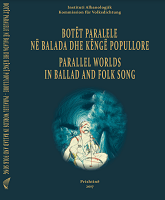THE BALLAD, A TRADITIONAL SONG OF CONTEMPORARY PORTUGAL: A SOURCE OF INSPIRATION FOR THE MUSICIANS OF SALAZAR REGIME AND THE “REVOLUTION OF CARNATIONS”
THE BALLAD, A TRADITIONAL SONG OF CONTEMPORARY PORTUGAL: A SOURCE OF INSPIRATION FOR THE MUSICIANS OF SALAZAR REGIME AND THE “REVOLUTION OF CARNATIONS”
Author(s): Anne Caufriez
Subject(s): Music, Recent History (1900 till today), Culture and social structure
Published by: Instituti Albanologjik i Prishtinës
Keywords: Portugal Ballad; Fado; Salazar Era; Freedom Singer; José Alonso;
Summary/Abstract: The romances (or ballads) are still rooted in communities of use in the rural areas of Portugal, even if they are intimately linked to a disappearing world (the agriculture made with manual techniques). The ballad is one of the very few types of traditional music which has been “popular” through the centuries until the present day and which has constantly been re-approached, playing many different roles in various periods. In the sixties and seventies, the period of the Salazar dictatorship, the opposition was transcontinental, because the dictatorship kept the country in poverty and non-literacy while also creating a colonial war in Africa (Mozambique, Angola, Cape Verde). Looking for a new cultural identity, the opposition tried to make a return to the traditional music of the countryside and to use this identity to protest against Salazar. It created an important stream of urban Portuguese song which coexists with Fado and Anglo-Saxon music today. The article is aims to show how the ballad, this traditional repertoire, became a national symbol of “popular” music in Portugal and to analyze the process of re-appropriation of that repertoire by composers and urban singers.
Book: BOTËT PARALELE NË BALADA DHE KËNGË POPULLORE
- Page Range: 225-240
- Page Count: 16
- Publication Year: 2017
- Language: English
- Content File-PDF

